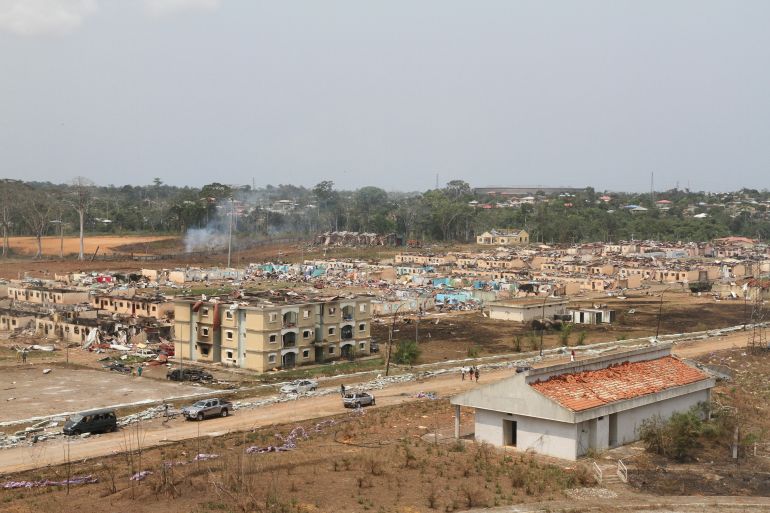Rights groups urge independent probe into cause of Bata blasts
As Equatorial Guinea begins three-day mourning period over disaster, Human Rights Watch says actual death toll ‘much higher’ than official figures.

Rights groups have called for a transparent and independent investigation into a series of massive explosions in Equatorial Guinea’s main city of Bata that flattened a military camp and nearby residential areas, killing scores of people and causing widespread destruction.
President Teodoro Obiang Nguema, who has ruled the oil-rich country with an iron fist for 42 years, blamed the military for “negligence” in stocking ammunition so close to populated areas.
Keep reading
list of 3 itemsDeath toll from devastating Equatorial Guinea blasts jumps to 98
In Pictures: Devastation caused by Equatorial Guinea blasts
On Wednesday, state television reported 105 people were killed and 615 were wounded by the conflagration at the camp of Nkoa Ntoma on Sunday.
But Human Rights Watch (HRW), citing Equatorial Guinea-focused human rights group EG Justice, said that “based on the number of bodies pulled from the rubble, the actual number of victims is much higher”.
It also urged donors and aid groups to send support directly to victims and their families rather than through the government, “given high levels of corruption in Equatorial Guinea”.
The buck stops with @ObiangMbasogo
We demand full, transparent, and independent investigation into the cause and real impact of the catastrophic blasts in #Bata https://t.co/cjXTV4WwCL— Tutu Alicante (@TutuAlicante) March 9, 2021
“The buck stops with [President Obiang]. We demand full, transparent and independent investigation into the cause and real impact of the catastrophic blasts in Bata,” Tutu Alicante, the United States-based director of EG Justice, wrote on Twitter.
The four cataclysmic explosions levelled the camp, which houses special forces, gendarmes and their families, as well as nearby residential areas on Sunday afternoon.
By the evening, Obiang announced a probe into the disaster, stating that the blasts were set off by a local farmer practising slash-and-burn agriculture near stores of explosives and munitions.
The defence ministry said the explosions were caused by heavy-calibre munitions and emitted “shock waves which totally destroyed numerous homes nearby”.
Obiang accused camp officials of negligence, charges he repeated on Tuesday.
But HRW called for international experts to conduct an investigation and said “unverified accounts … allege that the fire was started by soldiers ordered to burn brush and that it then spread to the armoury, or that it was started during training on the use of explosives gone awry”.
Satellite images from Planet Labs Inc, analysed by The Associated Press news agency, show only charred signs of fire at the site that remained centred on three rectangular buildings.
There was no sign of farming around the base and the only land-clearing work seen came from a construction project near those buildings, according to the satellite images.
The images show the military base at Bata had been undergoing construction at its southeast corner before the explosion. Old, earth-covered munitions storage facilities appear to have been removed and replaced by new structures.
A November 16 photo of the base shows three rectangular buildings sitting close to each other, AP reported. A satellite image of the site on Tuesday shows that those structures have disappeared, with only charred debris left scattered around them. That suggests a fire occurred at the site, possibly before the blast. A raging fire will ignite explosives if not contained.
Three days of mourning
Meanwhile, the government has declared three days of mourning beginning on Wednesday.
The only Spanish-speaking country in sub-Saharan Africa, Equatorial Guinea is one of the continent’s most insular nations.
Adding to the difficulty in understanding the full scale of the tragedy, air and sea links have been shut off for weeks because of coronavirus restrictions.
Only military and government aircraft have travelled to the site on the mainland from the island capital, Malabo, since the explosions.
“Regardless of what caused the blast, Equatorial Guineans deserve to know why the military is storing explosives in the middle of a populated area,” HRW researcher Sarah Saadoun said in Wednesday’s statement.
The government has made numerous appeals for international aid since the disaster, with Obiang pointing to a severe economic crisis fuelled by the COVID-19 pandemic and the plunge in the price of oil, the country’s main source of revenue.
But HRW warned: “Corruption has long stymied the oil-rich country from developing public services and providing social protection commensurate with its resources, and continued opaque governance puts any aid directly disbursed to the government at high risk of being looted.”